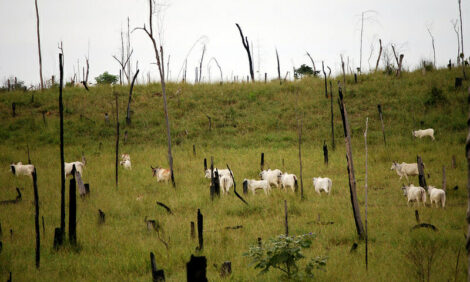



Canada and Manitoba Commit $17.2 Million to Help Beef Industry Implement Enhanced Feed Ban
CANADA - The Government of Canada and the Province of Manitoba are investing $17.2 million in the province's beef industry to help accelerate the elimination of bovine spongiform encephalopathy (BSE) from Canada's cattle herds."Canada's New Government recognizes the tremendous efforts of our beef and cattle industries to ensure the safest and highest quality beef products," said the Honourable Vic Toews, President of the Treasury Board and Member of Parliament for Provencher, on behalf of the Honourable Chuck Strahl, Minister of Agriculture and Agri-Food and Minister for the Canadian Wheat Board. "We are pleased to contribute funding to Manitoba's program to assist industry in adapting to the enhanced feed ban."
"Enhancing the feed ban is another important step in our support of Manitoba's cattle industry, eliminating any possibility specified risk material (SRM) could make their way back to cattle in any feed source," said Manitoba Agriculture, Food and Rural Initiatives Minister Rosann Wowchuk. "Industry and government working together presents a strong, united front to our customers nationally and internationally as we eliminate all sources of BSE from the human and animal food chain."
The Canadian Food Inspection Agency's enhanced feed ban, which was first announced in June of 2006, will prohibit the use of SRM - tissues that can harbour BSE - in all animal feeds, pet foods and fertilizers. The enhanced feed ban comes into effect on July 12, 2007.
Today's funding announcement will help the province's beef processing sector comply with the new regulation.
The federal contribution of $10.3 million to Manitoba is part of an $80 million commitment to SRM removal programs nationwide. Provincial programs are supported through 60:40 federal-provincial cost-sharing agreements. Federal funding to Manitoba supplements the provincial contribution of $6.9 million.
The effective implementation of Canada's enhanced feed ban will further ensure the protection of animal health, and strengthen the cattle and beef industry's markets in Canada and abroad. Canada's New Government is committed to a future where BSE is eliminated from Canadian cattle herds. In May 2007, the World Organisation for Animal Health (OIE) recognized Canada's BSE surveillance and eradication programs by officially categorizing Canada as a Controlled BSE Risk country.
More information on Manitoba's program can be obtained by calling (204) 945-7678.
Backgrounder on the Canada-Manitoba Specified Risk Material Disposal Funding Program attached.
BACKGROUNDER
Canada-Manitoba Specified Risk Material Disposal Funding Program
Why is the Government of Canada implementing the enhanced feed ban?Canada's current feed ban has effectively limited the spread of bovine spongiform encephalopathy (BSE) since being implemented in 1997. The enhanced feed ban is intended to further protect animal health, and will accelerate Canada's progress toward eradicating BSE from the national herd. Canada's actions are supported by an international team of animal health experts that reviewed the Canadian situation in 2003. Completing the feed ban requirement sends a message to the international trading community that Canada is committed to ensuring the highest quality and safest meat products possible for world trade.
What are specified risk material?
Specified risk material (SRM) are tissues that, in BSE-infected cattle, have been shown to contain the infective agent and transmit the disease. The following tissues are defined in Canadian regulation as SRM: skull, brain, trigeminal ganglia (nerves attached to the brain), eyes, tonsils, spinal cord, and dorsal root ganglia (nerves attached to the spinal cord) of cattle aged 30 months or older, and the distal ileum (part of the small intestine) of cattle of all ages.
What will the funding be used for?
Federal-provincial funding will be provided to a wide cross-section of industry to fund capital expenses for immediate and long-term infrastructure needs. Provincial funds will also be available to support SRM disposal at provincial abattoirs and support research into new and innovative ways to dispose of SRM.
Who is eligible for funding through this program?
Funding will be available to a wide cross-section of industry including the following groups:
- companies permitted to destroy or contain SRM;
- individuals and companies with new technologies that eliminate infectivity and add value to SRM;
- individuals and companies located in Manitoba, which provide disposal solutions for SRM generated in the province; and,
- provincially regulated red meat abattoirs in Manitoba that slaughter cattle.
TheCattleSite News Desk


